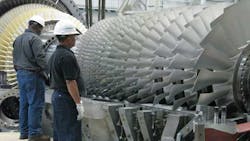Workforce: Siemens Introduces E-learning to its Charlotte Training Options
Training comes in many shapes and sizes: classroom training, on-the-job training, e-learning, one-on-one sessions. The question is: Which is best for you?
The answer, suggests Jeannine Kunz, may be a blended solution. Kunz is director of professional development at the Society of Manufacturing Engineers. SME delivers training options in a variety of formats, including conferences and on-site training as well as Tooling U, its online suite of training resources.
See Also: Manufacturing Workforce Management Best Practices
E-learning can provide both introductory and technical knowledge, for example, "but it cannot make you a welder," Kunz says. That requires an element of hands-on training.
Siemens' Charlotte Energy Hub in North Carolina is an example of one manufacturer's blended approach to learning. The site produces generators, gas and steam turbines, and services them. It employs about 1,500 people, 750 of whom have been hired since October 2010. It's also doubled its square footage with the opening of a new factory at the site in 2011. Gas turbine production was relocated there from Canada.
The training requirements for such a large population are significant. Siemens offers technical training, an apprenticeship program with a second apprenticeship program beginning in January, as well as comprehensive leadership development offerings.
"When we relocated gas turbine [production] here, we knew we were going to need lots of ways to [train], not just one," says Pamela Howze, training and development manager. Indeed, one group of production workers who moved over to the gas turbine factory when it opened first traveled to Germany to learn how to operate the new equipment; they ultimately became subject matter experts and then transitioned to become trainers for incoming employees at the new Charlotte plant. In fact, their training included a train-the-trainer course.
In early November the Siemens' Charlotte Energy Hub was ramping up to introduce e-learning by way of Tooling U. The online training will support both the technical training and the apprenticeship programs, according to Howze. Online training is an appealing option in several ways, she said:
- The factory is going paperless. Online training supports that effort.
- E-learning provides everyone with equal access to training, important in a 24/7 operation and important in scaling up a large number of new workers. Employees also can access training materials from home, a nice opportunity if they simply want to learn.
- Online delivery provides another option to help solve the skills gap.
"Online training is simply another approach," Howze says.
About the Author
Jill Jusko
Bio: Jill Jusko is executive editor for IndustryWeek. She has been writing about manufacturing operations leadership for more than 20 years. Her coverage spotlights companies that are in pursuit of world-class results in quality, productivity, cost and other benchmarks by implementing the latest continuous improvement and lean/Six-Sigma strategies. Jill also coordinates IndustryWeek’s Best Plants Awards Program, which annually salutes the leading manufacturing facilities in North America.
Have a story idea? Send it to [email protected].

